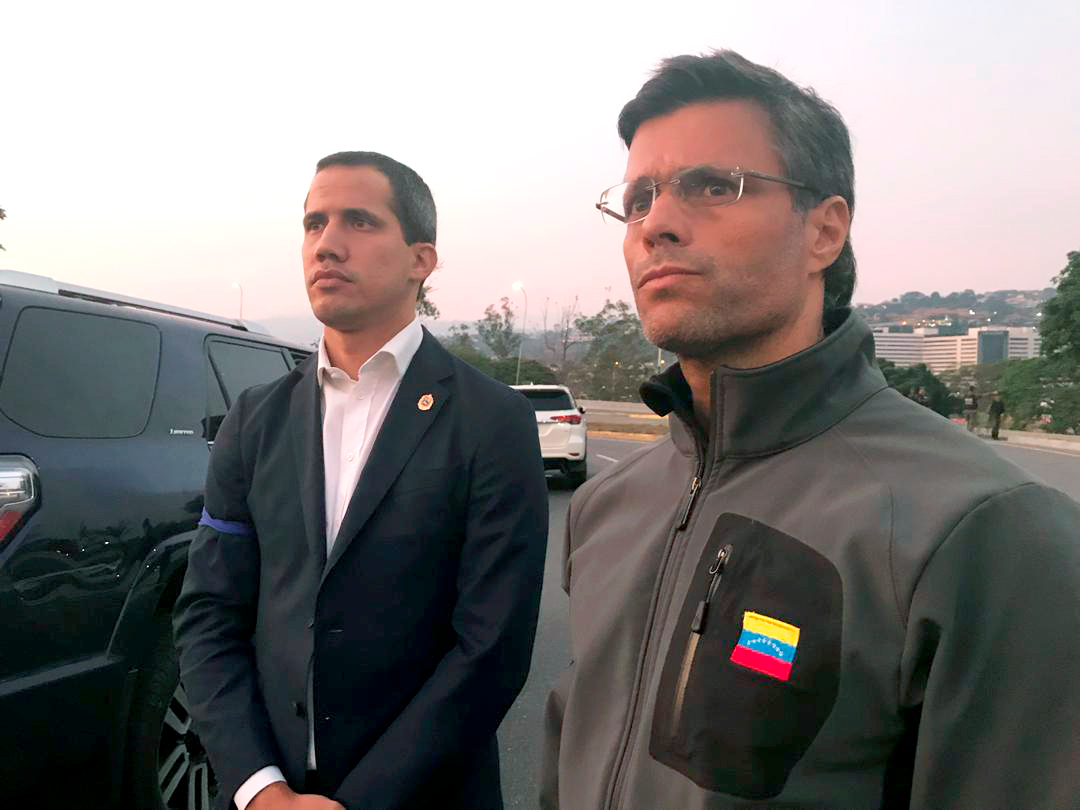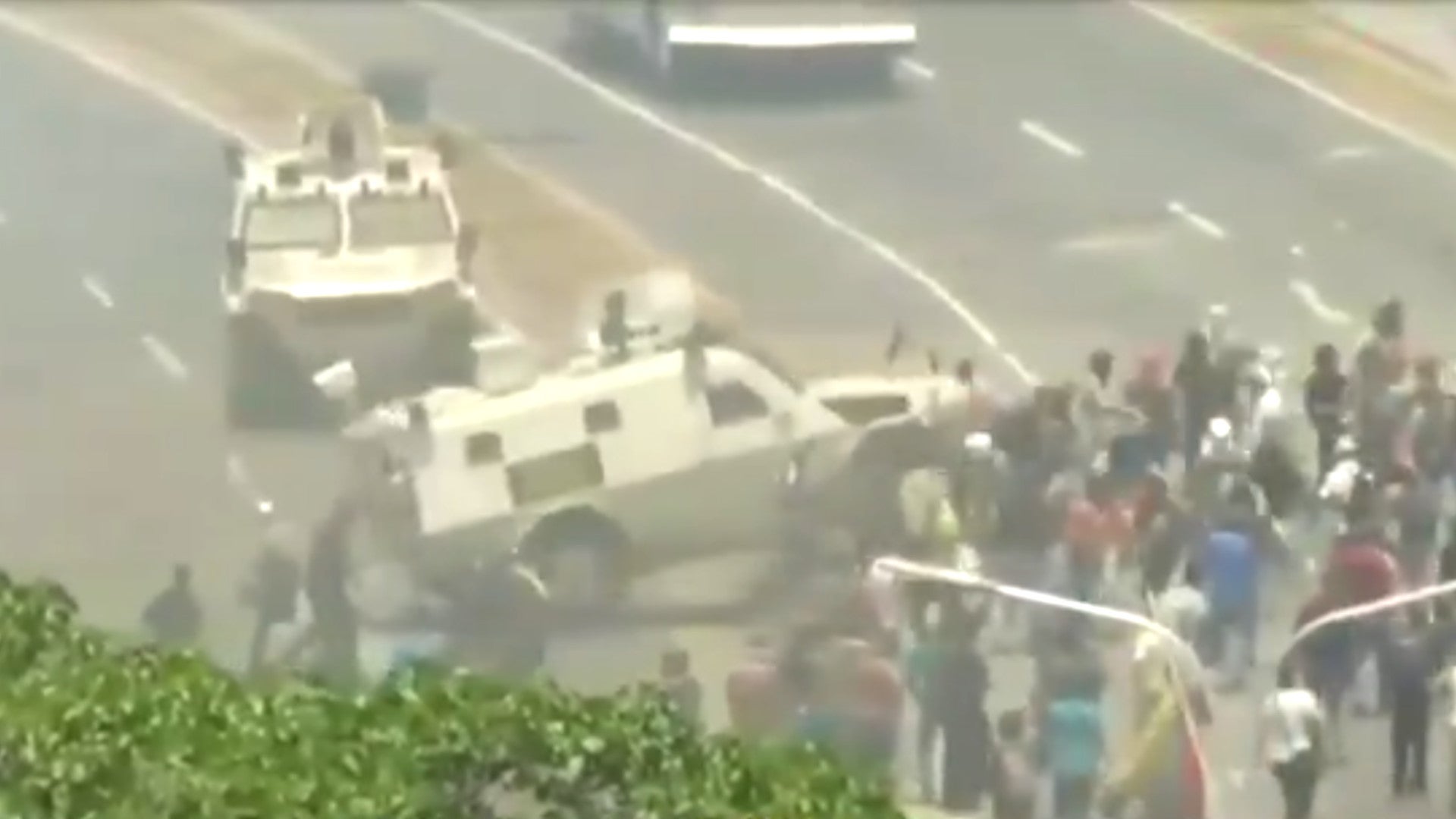The situation in Venezuela remains fluid after opposition leader Juan Guaido, backed by elements of the country’s military, launched a bid to forcefully remove embattled President Nicolas Maduro from office. Venezuela has been in a state of political upheaval since January 2019, when Guaido, President of the Country’s National Assembly, declared himself Interim President and quickly received the support of the United States, as well as many countries in Latin America and around the world. However, despite subsequent sanctions and threats, primarily from the U.S. government, Madruo has stubbornly held on to power.
Early on Apr. 30, 2019, Guaido announced the beginning of what he has dubbed Operacion Libertad, or Operation Liberty. The opposition leader called for massive popular protests to finally unseat Maduro and asked the country’s security forces to abandon the dictatorial leader. Armed members of the military and police who had already joined Guaido cause have donned blue armbands and bandanas now to distinguish themselves from forces loyal to Maduro.
Guaido was notably joined by Leopoldo López, another opposition who the Maduro regime has incarcerated, first in prison and then under house arrest, since he called for mass protests in 2014. Guaido claimed that military personnel keeping López under house arrest had freed him as part of Operation Liberty, but the events surrounding his release remain unconfirmed.

“People of Venezuela, we need to go out on the streets together, to support the democratic forces and to regain our freedom,” a Spanish-language post on Guaido’s official Twitter account read early on Apr. 30, 2019. “People of Caracas, all to La Carlota.”
Guaido was referring to La Carlota Air Base in Venezuela’s Capital Caracas, which appeared to be where the opposition leader intended to create a main base of operations. The base has figured into past political upheaval, including a coup attempt by Hugo Chavez to seize control in 1992 that included a brief air battle overhead. Chavez would become president in 1999, leading Venezuela’s government down an increasingly dictatorial path until his death in 2013, after which Maduro succeeded him.
In this latest political crisis, military personnel at the base had remained loyal to Maduro, driving out civilians who at one point managed to breach a fence along the perimeter.
Armed individuals loyal to Guaido subsequently set up positions with extra ammunition and bananas on a highway bridge outside the base, seeming to point to at least some preparations for a potential standoff. At around 11:00 AM, forces loyal to Maduro arrived on motorcycles to try and dislodge the fighters on the bridge, firing tear gas grenades and potentially shooting live rounds at them. This, in turn, prompted gunfire from the opposition positions, though available video footage shows them mainly firing blindly into the air.
There have since been sporadic reports of gunfire, but it is unclear whether these subsequent reports simply refer to the shooting on and around the bridge outside La Carlota. There is at least one clip that does show armored vehicles belonging to Venezuela’s national police attempting to force opposition protesters to disperse and running over some of them in the process. There is also footage of security forces loyal to Maduro arresting defecting members of the country’s armed forces.
Despite having apparently failing to secure La Carlota, Guadio and his supporters have since turned their attention to marching on the Miraflores Palace, Venezuela’s presidential offices, to demand Maduro step down. Forces loyal to the current regime had already blocked roads and other avenues leading to the palace and irregular militia associated with the ruling United Socialist Party of Venezuela, commonly known as colectivos, have also turned out to oppose the procession.
There are also reports of protests against Maduro in 22 of Venezuela’s 24 states. However, the actual size and scope of these demonstrations are unclear.
It remains entirely unclear how Guaido’s latest push to unseat Maduro will go. The opposition leader has been regularly calling for popular protests and defections since he first declared himself Interim President more than four months ago. So far, by every indication, the bulk of the country’s security forces remain loyal to Maduro.
It is also unclear why Guaido decided now was the best time to launch Operation Liberty. Unconfirmed reports from local journalists indicate that he may have intended to wait longer, but received warning that Maduro was about to have him arrested, forcing his hand. Significant elements of the military who had pledged to join the opposition reportedly backed out. This is supported by video footage the regime has released of apparent defectors now claiming they were “tricked” into supporting the Interim President by their officers.
If Guaido’s present bid to officially take control of the country fails, there is a distinct possibility that it could fuel the Maduro regime’s propaganda and prompt a new, massive crackdown on members of the country’s political opposition. Maduro blames Venezuela’s preceding major economic crisis, which led to critical shortages of food and medicine, and its present political unrest on foreign powers, chiefly the United States, actively undermining the regime.
Last year, Maduro also survived an assassination attempt involving explosive carrying drones, which he subsequently blamed on militants receiving support from the United States, as well as Colombia. More recently, the Venezuelan strongman blamed the U.S. government, including the Central Intelligence Agency, for widespread power outages and an apparent shipment of weapons from the United States bound for opposition members.
There is no hard evidence to support any of these claims, though the U.S. government has expressed its full backing for Guaido and the Interim President appears to be receiving political and monetary support from U.S.-based sources, as well as supporters in Latin America. There is always the possibility that Guaido has obtained weapons or other support for an actual armed uprising from these sources.
For instance, photos from the bridge outside La Carlota show one opposition fighter with an AR-57 carbine equipped with an expensive Trijicon SRS reflex sight. This is gun is a uniquely American design from a company also called AR57, in Kent, Washington. It combines many external features and aesthetics from the AR-15/M16 series of rifles, but fires the relatively rare 5.7x28mm cartridge, hence the name, and features a unique upper receiver that accepts the magazines from the FN P90 personal defense weapon. But it is not in service with any security forces anywhere in the world.
Of course, it equally possible, if not more likely that the individual in question had obtained this weapon privately in the past, too. American-made weapons have routinely shown up on the black market in Venezuela and in the hands of both colectivos and criminal gangs.
Also, in an apparent coincidence, on the same day that Guaido has launched Operation Liberty, Reuters has reported that infamous private military contractor Erik Prince has been proposing a plan to deploy 5,000-man mercenary force to support the opposition leader. Prince has been in discussions in the United States and Europe with supporters of President Trump and Venezuelans living abroad about financing the deal, according to multiple unnamed sources. The notorious businessman “has no plans to operate or implement an operation in Venezuela,” Marc Cohen, a spokesperson for Prince, told Reuters.
Regardless, it is unclear if U.S. government backing, whether it now includes covert action or not, will extend publicly beyond rhetorical and moral support. For some time now, President Donald Trump had publicly and privately advocated for a military intervention to oust Maduro. Florida Senator Marco Rubio, who is also a major critic of the current regime in Cuba, which also supports Maduro, has also called for more force efforts to unseat Venezuela’s dictatorial president, including publicly calling for a coup.
National Security Advisor John Bolton has reiterated a common refrain that “all options are on the table,” but so far there is no indication that the Trump Administration is planning a military intervention. Bolton previously notoriously appeared at a press conference in January 2019 with a notepad that read “5,000 troops to Colombia” in what some saw a veiled threat, but there was no subsequent deployment of U.S. troops to Colombia and Maduro never waivered. Depending on how long Erik Prince’s mercenary proposal has been in existence, there is a possibility that this could have actually been in reference to that plan, though the White House National Security Council refused to confirm or deny to Reuters whether it had ever met with the private military contractor about this plan.
In the past two months, the U.S. government has actually taken steps to avoid potentially becoming engrossed in an actual conflict in Venezuela, including withdrawing all diplomatic staff and other personnel from the country in March 2019. In addition, in that same time period, Russia, one of Maduro’s principal benefactors, has reportedly sent shadowy mercenaries, as well as uniformed troops, to bolster the regime and help ensure the functioning of key weapon systems, including S-300VM long-range surface-to-air missile systems. This inherently presents a risk that a U.S. military intervention on Guaido’s behalf could easily escalate into a larger confrontation with ramifications well beyond Venezuela’s borders.
At the time of writing, Leopoldo López has reportedly fled to the Chilean embassy in Caracas with his family, where he joins two other opposition leaders who have been staying there for two years now to avoid politically motivated criminal charges. Brazil’s embassy has also offered asylum to defecting members of Venezuela’s military who had joined Guaido. All of this can only be seen as a major blow to Operation Liberty.
Guaido has similarly few options if his push to unseat Maduro fails. If the Venezuelan strongman wasn’t looking to arrest the opposition leader before, he almost certainly will be now. If Maduro’s government levels charges at him over his armed uprising, Guaido will likely be looking at fleeing into self-imposed exile or hiding out in a friendly Embassy like López to avoid incarceration.
But with so much still uncertain, The War Zone will definitely continue to keep a close eye on this still-developing situation.
Contact the author: jtrevithickpr@gmail.com
